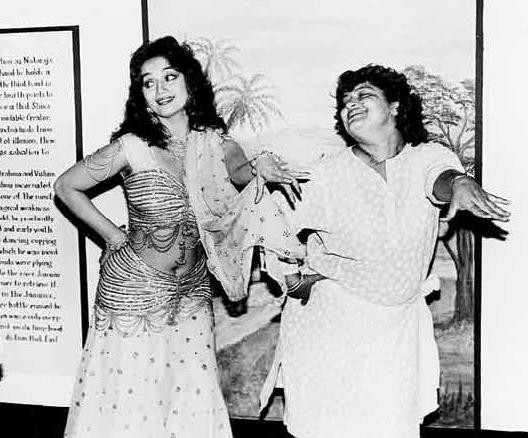Manish Gaekwad's Blog, page 4
August 12, 2020
Shobha Gurtu: To A Thumri’s Call
She accepted the challenge to sing Yaad Piya Ki Aaye, previously sung by her guru Bade Ghulam Ali Khan
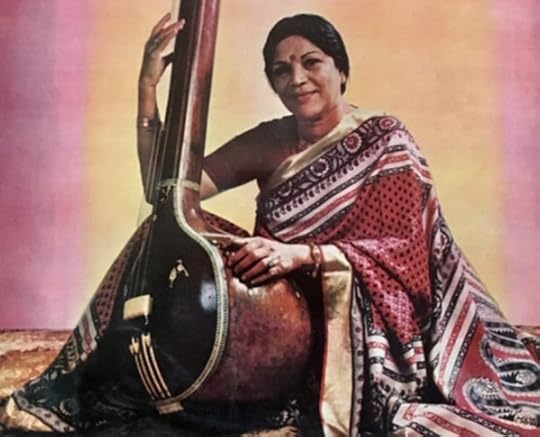
Menekabai tried teaching her young daughter to dance but Shobha would have none of it. She would run away into the field, singing aloud.
‘I want to playyyyyyyyyyyyyyy.’
Her voice echoed in the air. Menekabai noticed the ‘pukaar’ (call) in it. Shobha could be running farther but her voice would be ricocheting closer, calming Meneka. No matter how far she got, Shobha was always within earshot.
While Shobha watched the bees collect nectar, she would talk to them, buzz with them, instruct them to tell her mother that she was going to make them dance instead of her.
Shobha was trained to sing from an early age. She mastered the thumri, the dadra, the chaiti, the kajri, the hori in the semi-classical form and was soon performing on stage.
Her film songs, Bandhan Bandho in Pakeezah, More Saiyaan Bedardi in Phagun, Saiyyan Rooth Gaye in Main Tulsi Tere Aangan Ki were regularly played on the radio, carrying her voice far and wide.
https://medium.com/media/985eaaffb9eafdeca90dc17b9120d63a/hrefBut she didn’t enjoy singing in films as much as she liked to perform in concerts. Film music restricted the way she could modulate a thumri through bandish. The raag in film songs had a fixed scale and metre.
She said she always preferred to ‘outrun’ the song, as it trailed her improvisation. Singing to her had taken her childhood fascination for running away with the melody like a bee, hopping from flower to flower, just when you thought it would settle on one.
When actor-director Nana Patekar asked her to sing in his film Prahaar, she refused. She hadn’t sung in a film in more than a decade.
‘Ek thumri hai,’ (There is a thumri) Nana said.
‘Kaun si?’ (Which one?) she asked to appear invested in chitchat.
‘Yaad Piya Ki Aaye?’ he said.
‘Tab toh aur nahi gaongi. Bade Ghulam Ali Khan Saab na issi pehle gaaya hai,’ (I won’t sing it even more then. Bade Ghulam Ali Khan Saab has sung it before) she said.
‘Iss liye toh aap se binti karne aaya hoon,’ (That’s why I came to request you) he said. ‘Unke baad…’ (After him…)
‘Kya?’ (What?) she said, ‘Aap jaao yahan se, main nahi gaa sakti.’ (Please leave, I will not sing)
She considered Bade Ghulam Ali Khan Saab her guru. She did not want to discuss his legacy and death with Nana. And how could she ruin his exceptional and perfect thumri?
Yaad piya ki aaye
Ae dukh saha na jaaye
Haye, haye Ram
My lover’s memory troubles me
This pain is unbearable
O lord Ram
A vocal student, who was present in the room, had come to invite her to a music festival in another city. Shobha readily accepted to go along with her to avoid Nana.
One evening, sitting in a garden with her student, watching the sun set like dripping honey, Shobha was noticing the bees rising from the flowers to head home.
Her student asked her, ‘Why do you like thumri more than the other forms?’
Shobha pointed to the bees and said, ‘Mujhe doodh se zyada malai pasand hai.’ (I prefer the cream to milk)
The student followed the analogy to the bees looking for nectar, not tricked by the fragrance of the colourful flowers.
‘Agar hum apne aap ko madhumakhi samjhein, toh gaane ko raseela bana dena asaan ho jaata hai,’ she said. (If we dance like a bee, then it is easy to blend sweetness in singing)
‘Par aap ne toh mana kar diya,’ (But you refused) her student said, fearful but honest to remind Shobha that she could very well teach, but also follow her own words.
Shobha laughed and realised her student was right. She returned to Bombay and called Nana.
‘Chalo gaana gaate hain, mera khelne ka mood hai,’ she said. (Let’s sing, I am in the mood to play)
Singing the thumri in her style, she did not worry about comparison or slighting the guru. She sang like a playful bee, her honeyed voice as nectar for music.
https://medium.com/media/957a1670e498a9f86171f887f28aaf51/hrefDisclaimer: This is a work of fan fiction or more formally known as real person fiction. It is not for any commercial use. Read more on Real Person Fiction here.

August 9, 2020
Sriradha Banerjee: The Birth of an Elegy
Labon se choom lo, aankhon se thaam lo mujhko, she sang to Rekha.
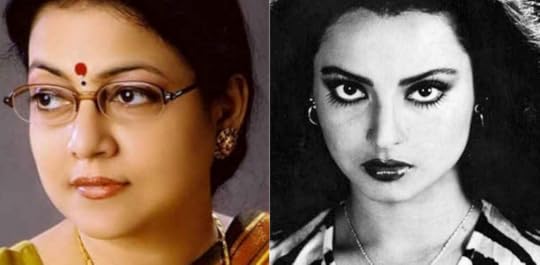
Sriradha was singing her most popular Bengali song, O Majhi Re (O, Oarsman) on stage in Toronto when one of her fans screamed.
‘Ekta Hindi gaan geye shuniye deben? (Can you please sing one Hindi song?)’ he said.
The mild-mannered people in the room gasped. How could he! The gathering was made up of middle-class bhadralok who had settled in Canada to escape the rotting Indian philistinism.
Hindi, or as appropriated in the west as Bollywood, was anathema to their ears. For the prabasi it was an affront on their rich cultural legacy epitomised by Rabindra Sangeet.
Sriradha continued to sing. She had never recorded a Bollywood song. She did not want to anger her zealous fans.
Filmmaker Basu Bhattacharya, who was present in the audience, had a different view on the subject. He found her voice apt for his film. He met her after the show, congratulated her and told her he would like her to sing in his film.
A year passed.
She thought he was being polite. She had forgotten about it till one day a call surprised her. She landed in Bombay. Bhattacharya told her she would have to rehearse for a week with the music composer Shaarang Dev. Lyricist Gulzar had written the words.
During rehearsal she learnt how to inflect the Urdu words, when to take a pause, when to pitch high and low. The process was not very different, but the language and her accent were going to be her litmus test. Would Hindi-speaking listeners warm up or would Bengali-speaking audiences begin to dislike her for being a sellout?
Sriradha was in two minds.
The film’s lead actor Rekha landed in the studio on the day of the recording. It made Sriradha more nervous.
‘I want to hear and watch you sing so that I can perform it in the film,’ she said.
Rekha was following in the footsteps of Meena Kumari, who attended Geeta Dutt’s recording of Na Jao Saiyaan.
https://medium.com/media/c45a74e01fad000a6383c15e1a70c274/href‘Do you know, this song will feature in a sequence involving a couple in bed, just like in Sahib, Biwi Aur Ghulam,’ Rekha said. ‘I am quite sure your sensuous singing will inspire me.’
Sriradha blushed. She was too shy to speak.
‘Don’t worry,’ Rekha said. ‘You will be fine.’
She walked up to Sriradha, held her in her arms and sang the first two lines in her nasally-voice to encourage her.
Labon se choom lo, aankhon se thaam lo mujhko
Tumhin se janmoo to shayad mujhe panaah mile
Kiss me with your lips, hold me with your eyes
Maybe I will find shelter after you create me
When Rekha kissed her forehead as a blessing, Sriradha realised in that moment that the actor was seeking a favour. She was not the one who needed to be rescued. Rekha was revealing something else here.
She had been playing strange characters in her recent films. The old ghazals of Umrao Jaan seemed to be the only way to remember her. Maybe it was Rekha who needed a swan-song more than Sriradha who needed to debut in Bollywood.
That doubled the pressure to perform for Sriradha but it also gave her the grit to excel. She asked Rekha to accompany her into the vocal booth.
‘Will you please stay with me in the room?’ Sriradha said.
‘Main?’ Rekha giggled. ‘Nahi, nahi, I will distract you. Am wearing so many trinkets; see this jhumka, this paayal, these thick red lac bangles.’
She pointed out the jewellery that would tinkle in the booth.
‘It is not a distraction,’ Sriradha said. ‘You will help me perform if I sing it directly to you.’
Rekha was mighty embarrassed but doubly pleased too. Sriradha sang without a hitch.
Main aarzoo ki tapish mein pighal rahi thi kahin
Tumhare jism se hokar nikal rahi thi kahin
I was melting in the heat of my desire
As I was passing through your body into mine
Bade haseen the jo raah mein gunaah mile
Tumhin se janmoo to shayad mujhe panaah mile
There were some memorable sins on the way
Maybe I will find shelter after you create me
Rekha watched her, breathing heavily and weeping silently. Sriradha’s voice seemed to be purging something rather deep from inside her that she had not felt the need to atone. So much of herself was reflecting in Sriradha’s gentle voice. Her life was flashing in her cloudy eyes.
After the recording, Rekha sobbed and hugged Sriradha.
‘Those were Asha tai’s ghazals in Umrao, this is me,’ Rekha said. ‘I hope people remember me for this wistful rendition by you Sree.’
Sriradha could not have got a better compliment. Later, when she saw the film Aastha, Sriradha felt Rekha was living the song. She wept and smiled. Watching Rekha on-screen was stirring, painful, but also liberating for Sriradha.
Tumhari aankhon ke saahil se door door kahin
Main dhoondati thi miley khushbuyon ka noor kahin
Far away from the shores of your eyes
I am looking for the light of the fragrance
Wahin ruki hoon jahaan se tumhari raah mile
Tumhin se janmoo to shayad mujhe panaah mile
I await by the road that takes your lead
Maybe I will find shelter after you create me
Sriradha never sang in Bollywood again. She had given voice to Rekha’s unsung story.
https://medium.com/media/475768b8d15dccb484cac3957ae00b2b/hrefDisclaimer: This is a work of fan fiction or more formally known as real person fiction. It is not for any commercial use. Read more on Real Person Fiction here.

August 5, 2020
A Sky Blue poem
Where the stars are
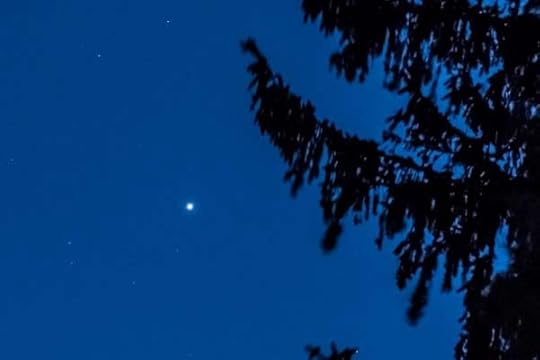
(For Shweta D’Souza)
What is your favourite colour, she asked
Aasmaani neela, i said
Sky blue like no other colour will do
Why, she asked
Because beyond it is the stars
Beyond it, i should be, i said
Invisible, but where everyone wants to go
Stars are made of us, hai na, i said
She laughed like one twinkling
The bluest sky brightens only its loneliest star

July 31, 2020
Chhaya Ganguli: A Ghazal For The Road
Aap ki yaad aati rahi raat bhar, she sang till dawn arrived.

Chhaya Ganguli was working as a broadcaster at the All India Radio and Doordarshan when music composer Jaidev met her and asked her to sing a ghazal in the film Gaman.
It was not an offer that could be easily refuted but it made her question his decision.
‘Main kyon?’ (Why me?) she asked politely, erasing the rest of the sentence that was forming in her mind about her selection. She was a neophyte in a sea of chanteuses in the ghazal form.
‘Kyunki main keh raha hoon’ (Because I said so), he replied.
He pulled out a thousand-rupee currency note from his wallet and gave it to her.
‘Advance token,’ he said.
She was even more startled now. She had never been so sure of her singing skill, and the money was too much to flaunt to her middle-class family. She hid it in a secret pocket in her blouse, afraid that someone might check her purse at home.
She wanted to wait till the recording to inform her family.
A day before the recording, she panicked. On a nippy winter afternoon, she wore a Dhaniakhali cotton cream-coloured sari with a red border. She paired it with a long sleeved blouse that had a secret pocket for her token money. She pulled a maroon cardigan over it, and stepped out. A student of botany, she went to a flower show at the Byculla zoo. Studying plants helped reduce stress she had learnt.
She took along with her the lyrics of the song. Singing to plants was another way for her to draw confidence.
Aap kī yaad aatī rahī raat bhar
Chashm-e-nam muskurātī rahī raat bhar
***
Memories of you haunted me all night
Tear-filled eyes glistened all night
She sang to the intensely fragrant flaming pink kailashpati flower, watched the red-skirted mountain rose dance in the breeze along side the yellow radhachura. She picked fallen leaves from the apta tree considered sacred and called sonpatta and tucked them in her secret breast pocket to still her beating heart.
raat bhar dard kī sham.a jaltī rahī
ġham kī lau thartharātī rahī raat bhar
***
All night the lamp of pain kept burning
The flame of pain kept flickering all night
She tried to walk around with the air of a self-reliant beauty described in Tagore’s verse. The red border of her saree fluttered in a rushing draft like the red-beaked palash flower taking flight.
She sat under a Krishna fig tree. The cone shaped leaves of the tree could be made into wallets. She thought of the thousand-rupee currency note now turning into a gold leaf with the sonpatta in her breast pocket. She took a sigh of relief, trying to concentrate on the shers of the beautiful ghazal written by the late activist-poet Makhdoom Mohiuddin.
Her mind wandered how he could be so deeply romantic and a Marxist at the same time. Did the communist not deplore romance and its sentimental indulgence?
bāñsurī kī surīlī suhānī sadā
yaad ban ban ke aatī rahī raat bhar
***
The melodious, enticing sound of the flute
Kept reminding me of you all night
She dozed off. As if Krishna’s mellifluous flute had lulled her to sleep.
When she woke up, she realised she had walked to the far end of the fifty-acre spread. The sun had set. The purse she was carrying, was missing. She had been robbed in her sleep. The city was notorious for robbing one’s dreams.
Frightened, she stood up and saw that the zoo had been abandoned. She had been forgotten. A glistening moon was shining a beacon of light on her. It helped her trace her footsteps back to the main gate.
yaad ke chāñd dil meñ utarte rahe
chāñdnī jagmagātī rahī raat bhar
***
Memories like recurring moons kept entering my heart
The moonlight gleamed all night
She told the guard that she had overslept. He let her out. It was close to midnight. The street was empty. No soul in sight, she wondered how she would get home. Feeling defeated, she walked a few steps. She heard a taxi’s horn approaching from behind.
The driver stopped the car.
‘Aap ko kahan jaana hai madam?’ (Where do you want to go Madam?), he asked.
‘Ghar’ (Home), she said.
‘Wahan toh sab ko jaana hai, par jaane kab subah ho.’ (Everyone wants to go there but who knows when that dawn will arrive), he said.
She told him the address.
‘Baith jaiye’ (Get in), he said.
As they neared her house, she asked him about his home.
‘Itni raat ko aap gaadi chalate hain, aap ko ghar jaane mein der nahi hoti?’ (You drive so late into the night, are you not delayed to get home?)
The driver laughed and said, ‘Madam, hum gaadi chalate hain taaki aap log ghar sahi salamat se pahunch sakein. Iss sheher mein aa kar apna aashiyaana toh ab afsaana lagta hai.’ (Madam, I drive late so that you can reach home safely. In this city a home for me is like a distant dream.)
She understood from his dialect, language, and philosophy that he was no less a poet than Makhdoom Mohiuddin. Poetry not only defined their haalaat (condition) but also allayed their pain.
‘Aap kahan se ho?’ (Where are you from?), she asked.
‘Lucknow,’ he said.
‘Kitne saal se ghar nahi gaye ho aap?’ (How long has it been since you went home?)
‘Tees saal,’ he said. ‘Soch raha hoon iss baar paise ikhatte ho jaayein toh Eid wahan mana loon.’ (30 years. Am thinking to save money and celebrate Eid at home.)
She stopped asking anything as they had reached the house gate.
‘Kitna hua?’ How much is the fare?
‘Teen rupaih, pandrah paise,’ he said, reading the meter.
She stepped out of the car, pulled out the thousand-rupee note from her blouse and gave it to him.
‘Arre baap re, he said. ‘Itna bada note.’ (Such a big amount)
His reaction reminded her of her own reaction when she was given the advance token. They weren’t so different from each other after all, she thought. Underestimating the value of their earnestness.
‘Madam, aap toh jaanti hi hain abhi-abhi notebandi hui hai. Chhutha nahi hai.’(Madam, you must be aware of the recent demonetisation. I don’t have the change.)
He was referring to Prime Minister’s Moraji Desai’s demonetisation drive announced a few weeks ago.
She nodded and said, ‘Aap rakh lo. Eidi samajh ke. Ho sakay toh ghar chale jaana.’ (Keep it. As Eid money. Go home if possible).
Saying so, she turned and walked away.
The next day in the recording studio Jaidev explained the mood of the song to Chhaya before she could sing.
‘Ek aurat apne premi, apne shohar ka besabri se intezaar kar rahi hai. Woh kivaad par khade raah taak rahi hai.’ (A woman is waiting for her lover, her husband. She is standing at the door, looking longingly at the deserted road), he said.
koī dīvāna galiyoñ meñ phirtā rahā
koī āvāz aatī rahī raat bhar
***
A lover wandered in the streets
A voice reached my ears all night
She understood perfectly. Her voice would be the light guiding the broken hearted to reach home.
https://medium.com/media/ac83aadf5fe3af1e347d43b3ddd4a75d/href(P.S. — She won a National Film Award for Best Female Playback for her debut song.)

July 28, 2020
Sudha Malhotra: A Love Song Denied
Sahir Ludhianvi wrote the lyrics of his unrequited love.
 Sudha Malhotra, Sahir Ludhianvi
Sudha Malhotra, Sahir LudhianviSudha Malhotra arrived at Sahir Ludhianvi’s house for the mehfil where poets and singers had gathered to celebrate a cool summer evening.
The tranquil atmosphere in the garden must have been opiated by the scent of opening jasmine buds that fused the ambience with a dream-like haze. Lights were dimmed to fading embers, crystals sparkled in golden liquids and laughter filled the room with pangs of familiarity. The sky had turned a melancholic purple as it strained its ear to spy on the genteel crowd.
Sudha was late; the mogra in her hair had soured on her journey from one end of the city to his house, giving her the apparition of a flower in wilt.
Sahir was reciting a poem. She heard the final two lines as she took seat at the end of the mehfil.
Woh afsana jise anjaam tak laana na ho mumkin
Usse ek khoobsurat modh de kar chhodna accha
***
The romance that cannot be given a fitting finale
We can abandon it at a beautiful fork in the roadhttps://medium.com/media/36311409f425d9e6061a21a8a4d403e8/href
While the guests clapped, the distraction allowed Sahir’s eyes to skim over it and find her looking at him without the slightest sign of approval. She had come to invite him to her wedding. He had already recited which turn in the road he was going to take on that foreseeable night.
When Sudha was asked to sing, she complained of a bad throat.
‘I cannot promise you I will be there, but you will not miss me even once,’ he said, accepting her invitation.
She believed he spoke only poetry, not words.
He went missing on the night of the nuptials. Instead, a letter arrived as a gift. When she read it the morning after, he had written a nazm asking her to compose and sing it for the film Didi.
‘Didi?’ she thought. Was he mocking their undefined relationship? He always knew that she was betrothed to another man since her adolescence. He was known to be rash but was he calling her a sister now?
When she was starting out as a young girl in playback, he had taken a shine on her. He would call her every morning to greet her and tell her that he had written a new ghazal, a new geet, a new nazm.
She listened with admiration, not romantic love.
She tried to rationalise. The nazm in the letter was of the highest calibre, an elegy on unrequited love.
The opening lines were:
Tum mujhe bhool bhi jao toh yeh haq hai tumko
Meri baat aur hai maine toh mohabbat ki hai
***
You have the right to forget me as you will
I cannot will the same as I have loved you
Was she blind to Sahir’s amorous feelings all along?
A film magazine published her photographs with Sahir, insinuating that she had ditched him. Sudha’s in-laws were upset. They forbade her from entering the studio.
She tried to convince herself that she surely did not do anything to encourage him. She decided to sing the nazm to prove it to everyone that they were just friends and would continue to collaborate in the future.
Sudha turned to her husband to seek approval. She said it was going to be her parting gift to her career.
‘Only one song,’ he said.
She sang it morosely, calling out to a suitor who kept disappearing further into the mist at the rise of the octave in her pleading tone.
Sahir met her after the recording, saying, ‘Let this beautifully-sung melody be our parting gift to each other.’
Stunned, she agreed. She couldn’t argue with him. The song would fuel hushed rumours. They never met again.
The melody made her one of the foremost playback singers to compose a tune in 1959. The memorable tune became her swan song. She stopped singing to focus on her conjugal life.
https://medium.com/media/cefca395dc57bbd043cca22db9dcd47b/hrefA habitual smoker and drinker, Sahir died of a heart attack in 1980. Sudha grieved silently for his broken heart that took his life. It had been more than two decades that she had met him. She hadn’t sung in films either.
In 1982, when filmmaker Raj Kapoor persuaded her to sing in Prem Rog, she flatly refused.
‘Think of it as a tribute to our beloved Sahir,’ he said.
‘Talk to my husband,’ she replied.
Once again, her husband said, ‘Only one song.’
Composed by Laxmikant-Pyarelal, the lyrics by Santosh Anand were self-reflective.
Yeh pyar tha ya kuch aur tha
Na tujhe pata na mujhe pata
Yeh nigahon ka hi kasoor tha
Na teri khata na meri khata
***
Was it love or something else
You didn’t know nor did I
It must have been in our eyes
It wasn’t your fault or mine
Singing it with tearful eyes, she recollected that cool summer evening when their eyes had met for one last time in his house. It was all there in his reddening eyes.
https://medium.com/media/c36af843dd2b60814d6529f47ed8ac7e/href
July 13, 2020
13 Hindi film songs homosexualising friendship
Read the lyric sheet. All loves matter.

The word ‘friend’ is alchemized from archaic language, distilled from the Proto-Indo-European root meaning ‘to love’. Bonding between genders of the same-sex is given a fraternal or sororal social register to safeguard it from an amorous disposition.
Sexual love is frowned upon as it ruins the platonic concept of love among friends. But the greatest lovers are friends first, where gender is second to friendship.
In this disruption, the Indian version of same-sex friendship stays loyal to the tradition. A friend as a lover is highly unimaginable and never recommended. Indians express bonding by holding hands, kissing, hugging; the affection is real but never sexual.
It is, however, open to queer reading and interpretation due to the intimate nature of such attachment bordering on the Greek idea of ‘a love where everything can be seen by anyone.’
Hindi film songs have greatly milked this idea. Show it openly, but never suggest it intimately. Categorised as dosti, documented as yaari and theorised as yaarana, these songs thrum with an undertow of romance when viewed from a queer lens.
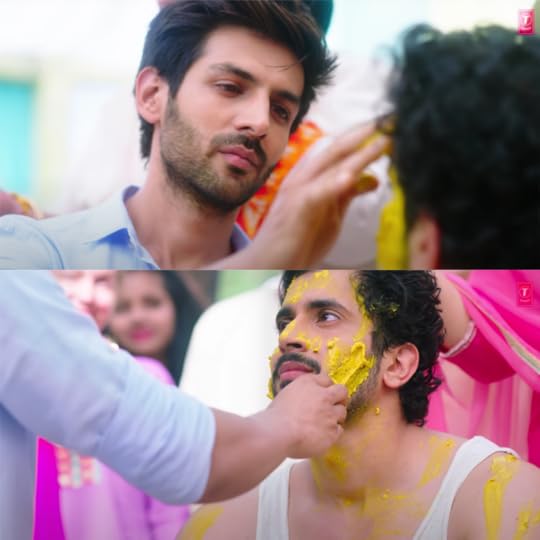
The most recent example is Tera Yaar Hoon Main in Sonu Ke Titu Ki Sweety (2018). The title itself is a giveaway. Titu ‘belongs’ to Sonu, who is ‘loaning’ him to Sweety. The intention is noble, but the emotion runs deeper.
Friendship is equated with nuptials. Sonu applies haldi to his buddy Titu in the wedding ceremony, anointing their bond as sacred as the seven reincarnations of a marriage.
Lyricist Kumaar writes:
Ek teri yaari ka hi
Saaton janam haqdaar hoon main
Tera yaar hoon main…
Maybe Sonu will make a great gift as dowry from the boy’s side.
https://medium.com/media/5cd74a72cafe20e1353bc826d6d035f2/hrefThe 1964-weepie Dosti, was one of the first films to feature odes, ballads, panegyrics to all-weather friendship. In the song Meri Dosti Mera Pyar, lyricist Majrooh Sultanpuri took the platonic concept of love and enshrined it.
Dosti hai bhai toh behna hai pyar
Where friendship was fraternised, there sisterhood was rounded naively. The commercial success of the film songs set the template for how friendship should be underlined. Giving it a bhai/behen solemnity takes away from the fun of it and places it on a pedestal.
https://medium.com/media/0e4d11c034e4b2ddf13d84d764f5368c/hrefIt took Yaari Hai Imaan Mera in Zanjeer (1973) to remove it from the Ram-Lakshman brotherhood ideal. The worship stayed intact, but the relationship snapped the umbilical cord like the firm strings in a rabab.
Gulshan Bawra wrote:
Pyar ho bandon se yeh, sabse badi hai bandagihttps://medium.com/media/f62d9544c121d6002b757b5ccdd7ef22/href
The interchangeable names of yaari and dosti shifted from the familial to a spiritual ascent in singer Manna Dey’s exhortation in this Kalyanji-Anandji composed tune. The composers are blood brothers placing friendship outside blood ties.
A decade later, the song Yeh Dosti Hum Nahi Todenge (Sholay, 1975), epitomised the thicker than (bhai-behna) blood friendship of Jai-Veeru. While it still embodied brotherly love, it gave off more impassioned vibes.
Lyricist Anand Bakshi wrote:
Khaana peena saath hai, jeena marna saath hai, saari zindagi
Sounds a little more than friendship. The two joined-at-the-hip buddies were looking for domestic bliss perhaps. The song anthemised gay repression that was in a desperate need of a vocal ally.
https://medium.com/media/1e4b90d825415c8fc40d25f82b58826b/hrefA third wheel entered the male-bonding in Aye Yaar Sun Yaari Teri (Suhaag, 1979). The heroine (Parveen Babi) loves one of them and approves of the two men’s friendship. She tries not to come in-between them. That should explain why (Shashi Kapoor) is the tuna in this sandwich. She sings Bakshi’s lyrics.
Aye yaar sun, yaari teri, mujhe zindagi se bhi pyaari hai.
She sanctions it, unlike Sweety in the Sonu-Titu triangle, who disapproves of their bromance.
https://medium.com/media/e7566550f114f615a2f4f76fee74d24f/hrefSalaamat Rahe Dostana Hamara (Dostana, 1980) takes a turn for the romantic. When singing Bakshi’s lyrics about growing up together, a childhood puppy love is hinted at in the line:
Tha bachpan bada aashiqana hamara
The Urdu translation of aashiqana is romantic or amorous. This friendship has clearly outgrown it.
https://medium.com/media/da024ed4cc706446174d8149983e4faa/hrefIn the Eighties, several paeans were sung in praise of the rock solid friendship of the two macho men Anil Kapoor and Jackie Shroff. Iterations included juggling the duet with either of the other two macho-er men Sunny Deol or Sanjay Dutt.
The visuals in the song Ek Duje Ke Vaaste (Ram Avatar, 1988) show the two men running in slow-motion to embrace. This is a standard heterosexual-romance shot. They laugh, they sob, they sing Anand Bakshi’s lyrics.
Ek duje ke vaaste marne ko taiyyar
Aisi apni dosti, aisa apna pyaarhttps://medium.com/media/ae7dbc646271ab5cc1e26fdb6f8e5f37/href
Professing such ineffable love, the two men look longingly and lovingly at each other. They ride bikes, cycles, horses and stop short of riding each other. They speak of thinking of each other a hundred times in a moment and even share the same mommy as one sings, Lagta hai hum dono ne ek hi maa ka dudh piyaa ho mitva ho.
Maa ka dudh is an expression of one’s virility enriched from the vitamin of mama’s lactating mamta. That makes these boys weirdly incestuous friends.
Qurbani Qurbani Allah Ko Pyari Hai Qurbani (Qurbani, 1980), written by Farukh Kaiser was a big disco hit, making friendship a sacrificial lamb at the altar. The sword-play in the song is a suggestive phallic prop to avoid coming under.
Filmmaker Mahesh Bhatt was so enchanted by this male-bonding trope that it became the central theme of some of his films: Naam, Saathi, Naraaz.
In Tu Kal Chala Jayega Toh Main Kya Karunga (Naam, 1986), two friends are so inseparable that they have exchanged hearts.
Anand Bakshi wrote:
Dur hum huay toh kya, dil toh dil ke paas hai
Friends are feeling the intense heat of love.
https://medium.com/media/499015766354a655213bb7becd9c4f20/hrefYaarana Yaar Ka (Saathi, 1991), both the film’s title and the song suggests the girl will be ornamental in their love story. The tactile friends Suraj (Aditya Pancholi) and Amar (Mohsin Khan) sing Sameer’s lyrics.
Tu hi tu dil mein mere
Cheer ke dil dikhla dunga
Like the hero worship of Ram by Hanuman, who rips his chest to prove that Ram’s image resides in his heart, these two men also claim to do likewise, while also hugging and kissing each other like a romantic couple and singing duets, unlike the Ram-Hanuman jodi.
https://medium.com/media/eebe0c86c876228b34f697c2079d0417/hrefThe Nineties was all about the homo-romantic friendship of Akshay Kumar and Saif Ali Khan.
Breaking free from the idolatrous model of male-friendship, they sang gaily about being different, ‘Hum dono hai alag alag (Main Khiladi Tu Anari, 1994),’ about getting together, ‘Koi nahi tere jaisa, koi nahi mere jaisa, hum dono mil jaayein toh mel rahega yeh kaisa (Keemat, 1998),’ and about friendship turning into love, ‘Dosti karte nahi, dosti ho jaati hai, dosti badh jaaye toh aashiqui bann jaati hai (Arzoo, 1999).’
The nineties was truly liberating.
https://medium.com/media/04ff77795180cf965b2c5ce523e68603/hrefIn Mustafa Mustafa (Duniya Dilwalon Ki, 1996) Mehboob and PK Mishra write:
Day by day badhta hai, dil se dil mil jaata hai, jaadu hai aisa friendship ka
The lyrics are in-sync with love and friendship sharing the same genome. Mustafa is one of the titles for the Prophet in Islam. AR Rahman, who composed this melody, must have been aware, comparing a friend to the chosen one.
https://medium.com/media/1a3faba341285e2be3c3256a2f0a9c1b/hrefFemale bonding is given the short shrift in film songs. Taake Jhaanke (Queen, 2013) deserved its own queer love story between the free bird Vijayalakshmi (Lisa Haydon) and the blossoming bud Rani (Kangana Ranaut). In another article, I have discussed the explicit lesbian romance of another queen and her handmaiden in Razia Sultan (1983).
https://medium.com/media/23ff37bdc93075c15b5e6f8277d0393b/hrefPerhaps the most compelling evidence of friendship with benefits has been in the song Tere Bin Main Kuch Bhi Nahi in Mahesh Bhatt’s Naraaz (1994).
The lyrics by Rahat Indori goes without naming the love that cannot be spoken of but there is an unmistakeable hint about its secrecy.
Sonali (Sonali Bendre), for lack of a better screen name, follows two friends Deva (Mithun) and Ajay (Atul Agnihotri) around a temple with ‘less erotic and more aesthetic’ sculptures.
The night is weighing heavy on Deva who is lying next to Ajay and sings:
Do shehzaade raat akeli
Reh na jaaye baat adhuri
He wanders ahead humming, half-embarrassed by his half-stanza and his own half-admission.
The translation reads as ‘Two princes roam in a moonlit night. I hope we can convey our message to each other.’
The subtext is loaded with homosexual love.
A perplexed Ajay, in composer-singer Anu Malik’s ingratiating voice, asks him:
Mere bhai tu mujhse kuchh kehna chahata hai
Keh de na
Yeh adhoori baat mujhe samajh mein nahin aati
Koi toh badi baat hai bhai
Apne chhote bhai se kyon chhupaataa hai
Ajay looks up to Deva as a brother, but the feeling isn’t so mutual.
Deva replies:
Main dil hoon dhadkan tu hai
Kaise bhooloon bachpan tu hai
One is the heart, the other the beat of the pulsing heart. Love and friendship are one and the same.
https://medium.com/media/5265b9e77375a9125cb43eeb60f30b2b/href
July 9, 2020
PHOTO ESSAY: The Homoeroticism of the Akshay-Saif Bromance in the 90s
The proof is in the pictures.
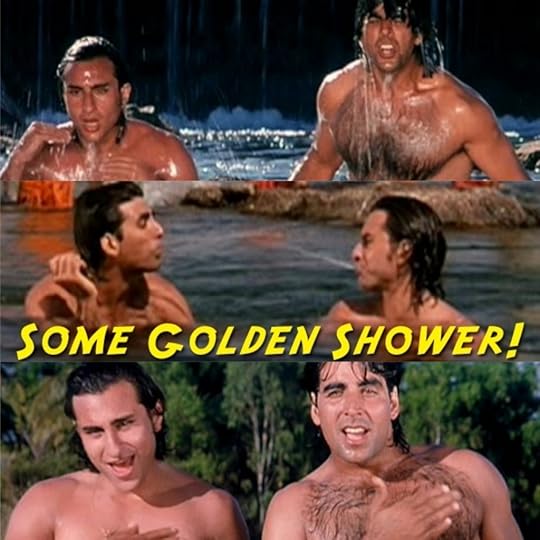
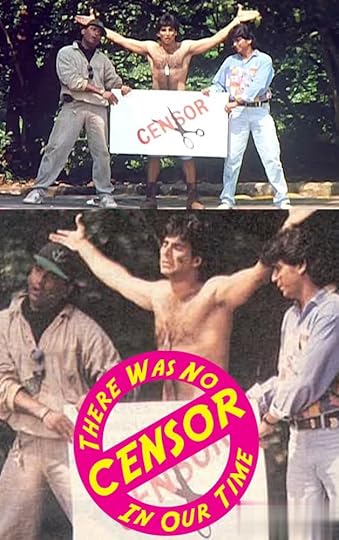
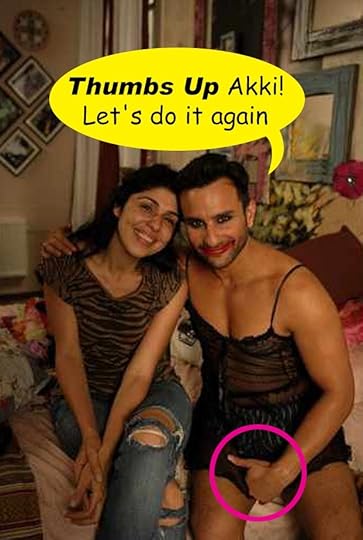
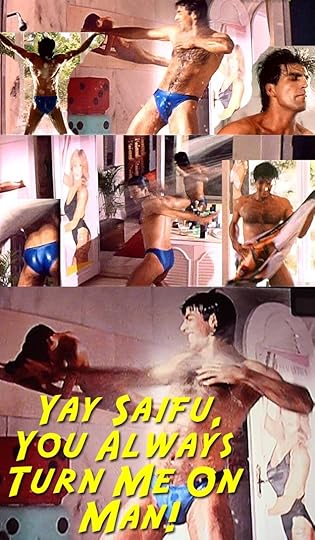
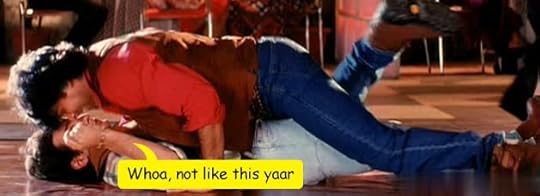
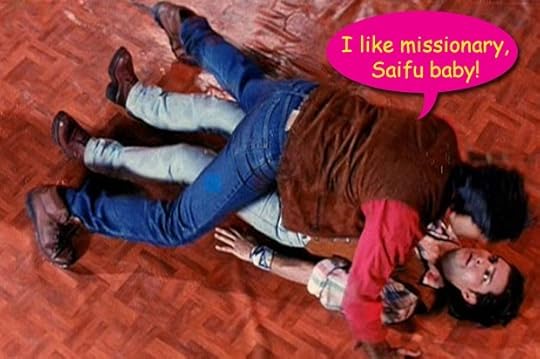
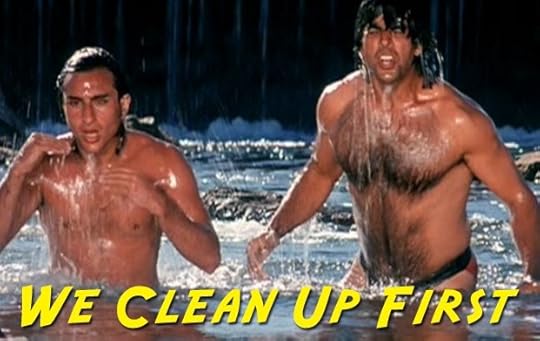
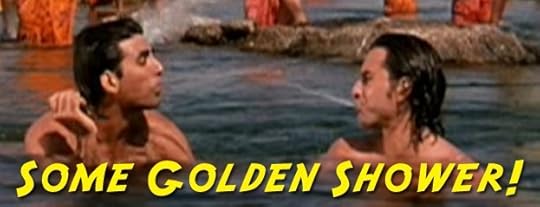
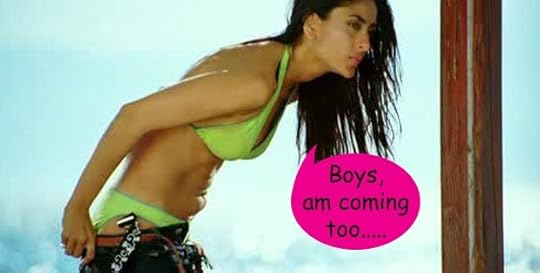
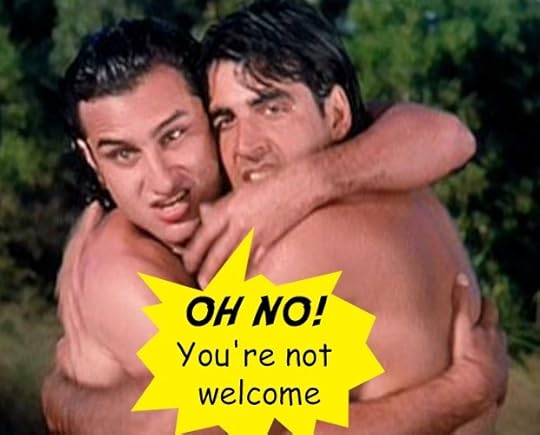
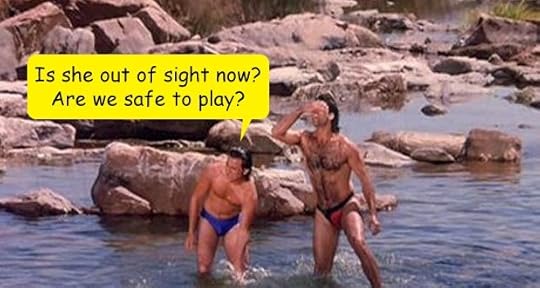
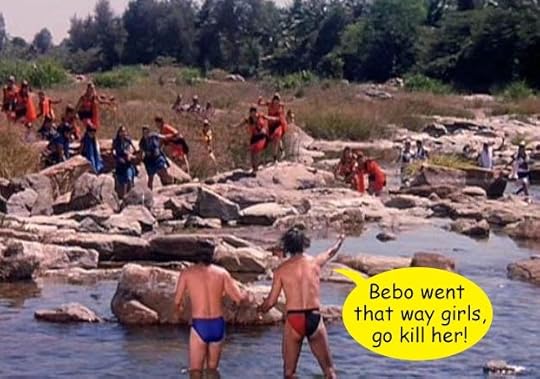
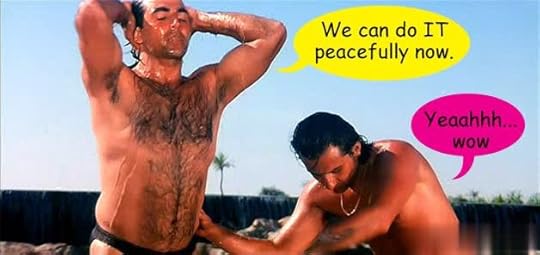
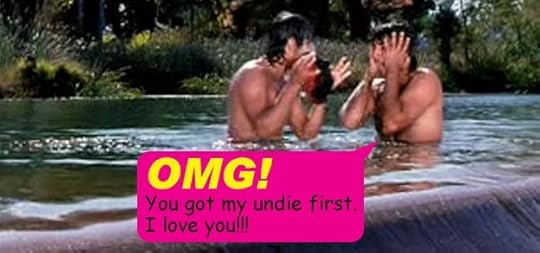
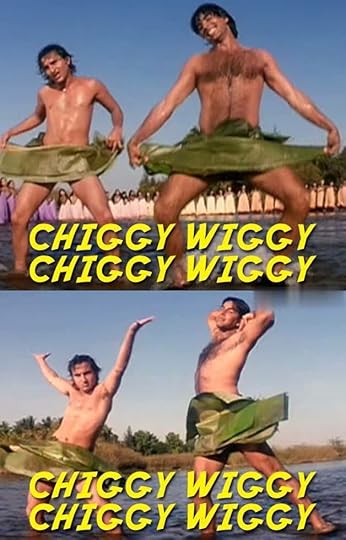
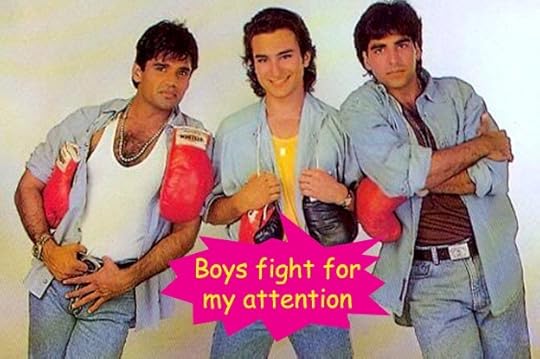
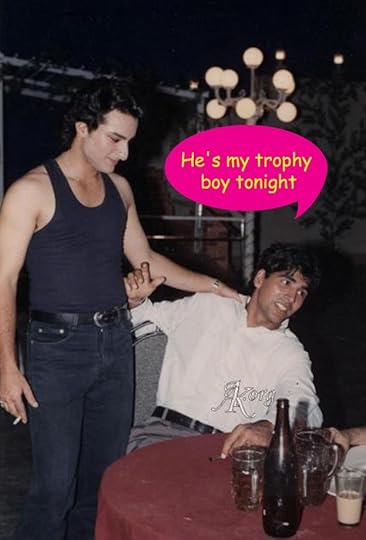
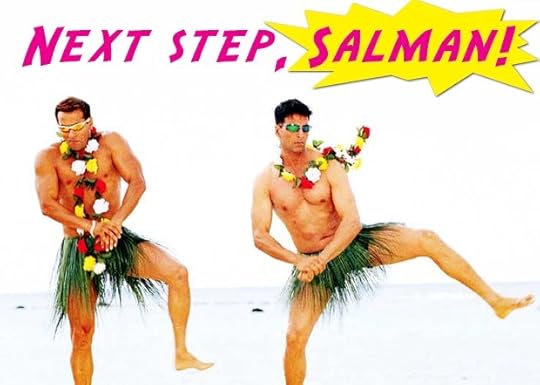
The boys, and the girls, are turning up the heat how how…
https://medium.com/media/e13f8713299f6ac2e2f475ac18cd8a5a/href
July 8, 2020
Why was Irrfan Khan’s gay film Adhura banned?
In1995, the Censor board did not approve of the same-sex romance.
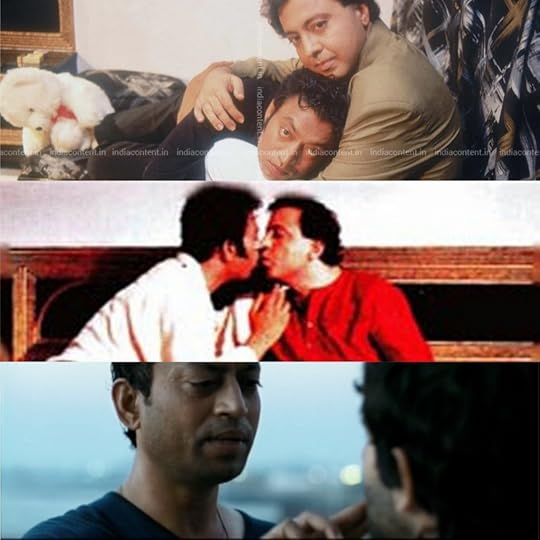
In 1995, Irrfan Khan starred in a gay romance that was banned.
In the film ironically called Adhura (Incomplete), Irrfan Khan plays a journalist who has an affair with an ageing industrialist.
Art dealer and gallerist Ashish Balram Nagpal played the role of the industrialist. Kitu Gidwani was playing a key role as Irrfan’s wife.
According to an article in SpotboyE, the story line suggests that the relationship turns sour, leading to a tragic climax.
In his book Queer Asian Cinema: Shadows in the Shade, published in 2000, author Andrew Grossman says the film was made as a pilot for a television series but was never televised.
An IndiaToday report claimed the film was directed by Sunil R Prasad and was to be released in July, 1995. Precisely in this month 25 years ago.
The 90-minute feature was not approved by the CBFC for its queer content. Adhura was never released after the censor board banned it.
Why did Irrfan Khan not revive it later?
In 95, Irrfan Khan was doing television and was looking for roles in film. It wasn’t until as Lafcadia in Asif Kapadia’s The Warrior (2001), and later in his breakout role as Ranvijay Singh in Haasil (2003), that he managed to get a foothold in the film industry.
Khan did not get cold feet when the fate of Adhura was undecided. He played a queer character in Mira Nair’s 17-minute short film Migration (2008).
As Abhay, a closeted man married to Divya (Sameera Reddy), Khan romances a college-student Imran (Arjun Mathur) and even enacts the role with affectation to snare Imran’s attention in the presence of his docile wife.
https://medium.com/media/299008b3b28061dfaf35f9380d529d0e/hrefMigration was perhaps the only other time Khan enacted the role of a queer man. In Adhura, the character had a longer and more detailed arc. It depicted a relationship fuelled by passion and destroyed by it.
Irrfan never spoke about Adhura and soon it was forgotten. Had it been released on time, it would have ushered in the wave of queer cinema that was on the anvil in the 90s.
In the 1991 film Mast Kalandar, Anupam Kher was Pinkoo, a gay man in pastel suits and a flaming orange mohawk. He gets his own dance number, a reprise of Ek Do Teen, is arrested in the climax (shot in the Mannat bungalow) and ends up in a prison cell just like the flamboyant queer man in Sholay (1975).
https://medium.com/media/0021b7ffce4a60b5cf7ebb82f0059ce6/hrefThe same year, Sadak featured Sadashiv Amrapurkar as a bloodthirsty transgender pimp Maharani. Pinkoo was an effeminate caricature and Maharani was a menacing villain.
Queer representation was extremely problematic and a gruesome death or jail was often the refuge of such criminal behaviour.
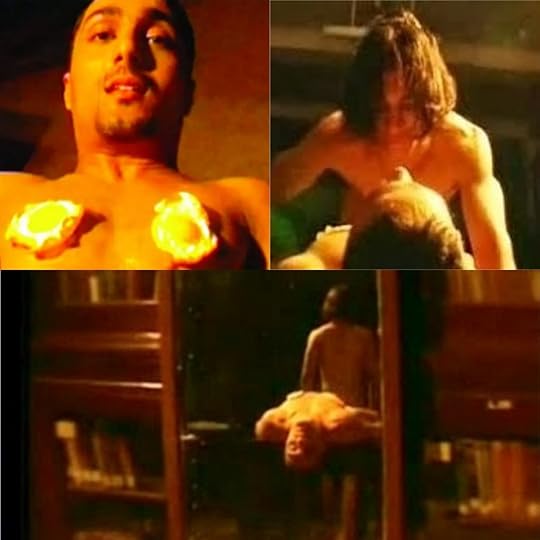
Riyad Wadia’s short film Bomgay (1996), featuring a lusty Rahul Bose having sex with Kushal Punjabi in a library was the first such positive representation without apology. Deepa Mehta’s Fire (1996) followed much public ire and a vote of solidarity from the queer community. In Bombay Boys (1998), a queer romance was a sub-plot without dire consequences.
Regional cinema had long before depicted same-sex romance in the Marathi film Umbartha (1982), and in the Malayalam films Randu Penkuttikal (1978) and Deshadanakkili Karayaarilla (1986), though often with tragic consequences.
But Hindi cinema was severely lacking in queer representation. 1995 was the year of DDLJ in Hindi cinema. The other films in the top ten list of that year were: Karan Arjun, Raja, Rangeela, Barsaat, Coolie No 1, Sabse Bada Khiladi, Trimurti, Ram Jaane, Akele Hum Akele Tum.
None of them had anything to do with the reality of real people and real lives, barring maybe Mansoor Khan’s Akele Hum Akele Tum (script lifted from Kramer Vs Kramer, poster lifted from Sleepless In Seattle).
Adhura could have been a collision of the two worlds of escapism and existentiality. The two themes that Irrfan Khan was capable of absorbing and expressing sleepily (or dreamily) in his non-speaking part in Mani Kaul’s 1994 short film The Cloud Door.
https://medium.com/media/8b3c15e825853e9bb2a658ad81d62560/href
July 7, 2020
The Sapphic Romance of Hema and Parveen
Khwaab ban kar koi aayega to neend aayegi

Hema Malini refused to lie down in bed with Parveen Babi.
‘What is this I hear Kamal saab?’ she said, ‘A chambermaid is romancing Razia?’
‘What is wrong with that? asked the director filming a song sequence.
‘What about my image Kamal saab? Mera role Sultan ka hai… al-Sultan al-Muazzam Raziyat al-Din bint al-Sultan,’ she said, trying to impress him with her clear pronunciation of the queen’s title and her own histrionics.
Kamal Amrohi looked blank because he had trained her to rote those words.
She continued falteringly, ‘Aur…aur main iss desh ki Dream Girl hoon. I represent the ideal fantasy woman. I cannot do such things.’
‘Exactly Hema, sirf ek Dream Girl hi aise khwab dikha sakti hai,’ he said.
‘Kaise?’ she asked.
‘Have you not heard the lyrics of the song?’ he said, referring to Jan Nisar Akhtar’s lucid words and Khayyam’s shimmering music.
‘Khwaab ban kar koyee aayega toh nind aayegee
Abb vahee aake sulaayega toh nind aayegee’
‘So?’ she said.
‘So, you don’t worry my dear, everything will look like a dream and your reputation will not be sullied. I promise you that.’ he said.
‘But I will not do anything am telling you Kamal saab?’ she said.
‘You don’t do anything anyways, it is a director’s medium, remember? Leave it to me. Just close your eyes and sleep.’ he said.
He instructed Parveen Babi to stroke her face with an outsized ostrich feather and lull her as she sang,
‘Baat jo sirf nigaaho se kahee jaatee hai
Koyee hontho se sunaayega toh nind aayegee’
He asked Hema to coyly look away to remind her viewers that she was thinking of them. She liked the idea and closed her eyes.
This is when the director quickly instructed Babi to move her hand across Hema’s face and shoulder for the next stanza.
‘Narm julfo kee mahak garm badan kee khushabu
Chupke chupke woh churaayega toh nind aayegee’
Hema squirmed with pleasure and enjoyed the strokes of tender affection.
‘One minute,’ she said. ‘Kamal sir, I am liking this a lot but I don’t want my fans to think I am like this, ok?’
‘Oh, you carry on; see those two little girls rowing the boat are the viewers. They disapprove, so you are safe.’
‘Then it’s fine,’ she said, ‘Let’s carry on then Parveen.’
A pleased Parveen placed the ostrich feather on them. She bent her head to kiss Hema on her lips.
The two girls rowing the boat gave the disapproving look. Audiences were going to be shocked by the vulgar passions of the queen.
Hema’s eyes dilated, her toes curled, she was in the throes, melting when Babi sang,
Jism haatho kee haraarat se pighal jaayega
Aag rag rag me lagaayega toh nind aayegee
That night, exhausted from the shoot, Hema went home to a drunk and happy Dharmendra.
In bed, hassled by his rough moves, she shoved him away, saying, ‘Uff, get way, cave man, no narmiyat you have is it?’
He slobbered. She walked to the window, looking at the sleepless sky adorned with a thousand blinking stars.
Choom kar raat jo sulaayegi to neend aayegi
Khwaab ban kar koi aayega to neend aayegi
Parveen’s touch had renewed her. She wanted more of it. She recalled the final stanza of the song. When torment feels like respite. When someone’s touch puts you to rest.
Koi tadpaega har aan toh chaen aayegaa
Koi har raat satayega toh neend aayegee
It felt pure as love.
https://medium.com/media/59e3ab3d3d5bc7ee45cc096e40fb40a4/href
July 3, 2020
A telephone conversation about Saroj Khan
Par woh mari kaise?
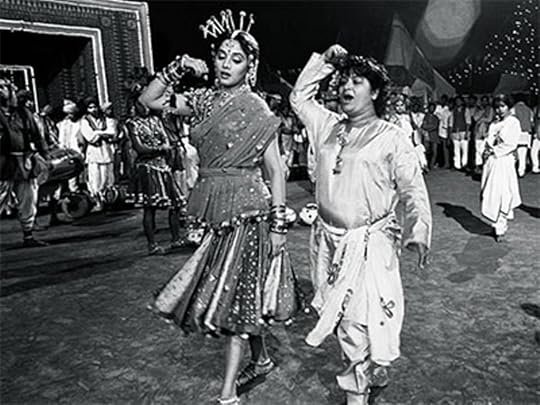 Photo: Dayanita Singh
Photo: Dayanita SinghMe: Aap ne suna, Saroj Khan guzar gayi.
Mother: Oh, kab?
Me: Aaj subah.
Mother: Arre, arre (clicks tongue).
Me: Aap toh mile honge na?
Mother: Haan, Patita film ke set par (I hear patootie).
Me: Oh, dance kis ko sikha rahi thi?
Mother: Shoma Anand
Me: Bas ek baar miley thay?
Mother: Nahi, nahi, kai baar Shanmukhananda Hall mein unka dance programme dekha.
Me: Phir, kabhi baat kiye?
Mother: Arre, nahi nahi, hum log toh duur se dekh lete thay.
(She is talking about the girls from the Congress house kotha who could not muster the courage to speak because of their illicit background.)
Me: Par Bandook Gully (kotha in Bowbazar, Calcutta) mein toh sab khoob nachte thay Saroj Khan ke dance ki naqal kar ke, woh Mere Haathon Mein Nau Nau Choodiyan Hain…
Mother: Haan, woh toh bahut chala, par uss time tak hum log ko maloom nahi tha ke dance kisne sikhaya…Saroj Khan toh baad mein zyada popular hui na…
Me: Kab?
Mother: Jab woh Madhuri ko sikhane lagi. (The television boom in the 90s made Saroj Khan a household name.)
Me: Kaun se gaane pe?
Mother: Dhak dhak karne laga. Dhak dhak toh bahut mashoor hua. Par woh mari kaise?
Me: Heart attack.
What made her famous also stopped her heartbeat.
